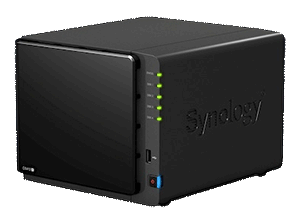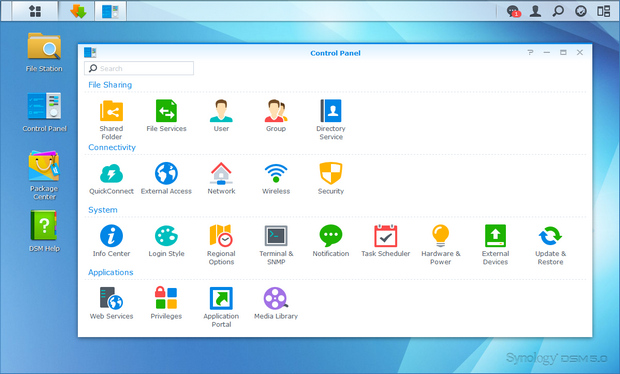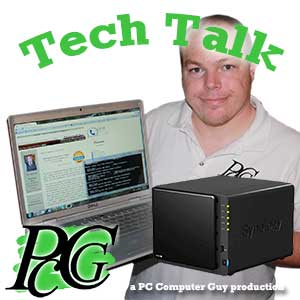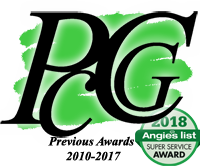Synology NAS Drive – Amazing!
NAS Server | Tech Tips Podcast by PcCG
Subscribe via Itunes | Subscribe via RSS
What is a NAS Drive?
NAS stands for “Network Attached Storage”. Typically we think of external storage in terms of flash drives and USB hard drives. The basic NAS is the same in concept, except it attaches to your network (i.e. your router). By attaching the drive to your router, you can access the files from any other device on the network. We use this a lot for backing up multiple systems. Instead of getting a USB drive for each system, we use a single NAS drive, allowing multiple computers to back up to a single drive. It can also be used as a “file-server”, where files are stored and shared among multiple systems on a network. This is a common use in businesses.

Beyond basic storage some companies produce NAS Servers. These NAS Servers do much more than simply store files on a network. They can host webpages, manage advanced permissions allowing users to share storage as well as have their own password protected storage space, allow remote access of the information and much more. Several companies offer NAS Servers, but by far the best on the market is Synology.
Synology NAS Servers run Linux with a beautiful easy to use web interface. You can pull up your Synology NAS in a web browser and configure thousands of different things with it. Normal web interfaces, like those on routers allow inputting of information. The Synology NAS systems feel more like “Windows” in a web browser, with a full blown GUI (Graphical User Interface). They are very reliable, fast and inexpensive for what they offer.
With these NAS Systems you can
- Centralize storage of information, allowing for easy backup of all important data
- MAP Network drives, allowing the NAS to appear as the “R” drive for example in your computer.
- Create users (who can reset their own passwords if they forget!) and assign permissions to nearly all aspects such as storage folders and services such as remote access of information
- Centralized storage means one backup – instead of having to purchase carbonite for 5 computers.
- Redundancy: RAID 5 capabilities – allowing 1 of the 4 hard drives to fail, and not lose any data or suffer downtime. With Raid5 if one of the drives fails, the system can “figure out” the missing information from that drive, and rebuild it when the failed drive is replaced.
- Many server applications such as (but not limited to)
- Web Server
- File Server
- VPN Server (Support PPTP, OpenVPN and IPSec VPN Technologies)
- Could Station Server
- Sharing folder/files with links to external partners
- Media Server (Such as Plex, allowing XBOX/TV's to stream media stored on the NAS)
- FTP Server
- Backup Server for Apple Products
- Print Server
- Mail Server
- Cloud Station – Synology’s version of “dropbox”, allowing you to use the server instead of paying for cloud storage that can sync to computers as well as apple and android mobile devices
- Cloud Syncing – Allowing the Synology to sync with all major cloud providers like Dropbox, OneDrive, Box and others
- Backup to Amazon Glacier for offsite backup in case of theft/natural disaster typically for a fraction of your current off-site backup solution.
One of the key elements to these systems is the number of ways to access your information off-site. You can simply plug in a web address in your browser to login and access the files. We prefer using VPN, which is what banking systems use to encrypt information sent over the internet. When using a VPN connection to the server, you can access files in the same manner as you do in the office. It’s as if you are in the office – allowing you to access mapped drives like you would at your office computer. Another benefit of VPN is if you connect to a public Wifi such as Starbucks, you can ensure your information is secure from that public hotspot by connecting to your Synology VPN to encrypt the traffic.
 (Diskstation Web Config Interface)
(Diskstation Web Config Interface)
These NAS Systems we’ve found to be very reliable. If connected to a UPS, we’ve had a couple running over a year without a single minute of downtime or reboot required. In at least 2 situations, clients had other NAS Drives and servers and frequently had to reboot the drives. Once we replaced them with a Synology NAS drive, the problems went away.
One client used a “Drobo” NAS server and had regularly experienced slowness when using the network drives. We installed a Synology NAS drive, while leaving the Drobo connected and did a comparison. We copied a 500MB file from the Drobo which took a couple minutes. We then copied that same file from the Synology, and it was done in seconds. The customer’s reaction was amazement.
For business or home users that wish to keep their information safe and have reliable access to it in multiple forms, these things are the way to go. I myself have one just because they are such amazing little boxes.
We supply these NAS Servers for $1500 to $2000 depending on the amount of storage desired. Storage can also be upgraded down the road without having to replace the entire system.
Installing applications to the Synology NAS is similar to installing an app on your phone. Just a couple clicks and you’re done. Synology offers hundreds of different packages from Human Resource Management software, to Wordpress and Drupal to DNS Server’s and more.
It is rare that we are “overly impressed” with a product, but the Synology NAS drives are definitely one of the few that fall into that category.
Drawbacks to consider with a NAS Server are
If the NAS Server crashes – everything comes to a halt. While this is rare, it can happen. Synology does offer “high availability server” option, where two NAS Servers are connected together, and if one fails, the other takes over in seconds with all the information already loaded and ready to rock.
Since information is stored on the network, it’s going to be slower than accessing information inside your own system. This is hardly noticeable almost all situations, but is “technically true.” To minimize this, we typically recommend Gigabit networks so things run very fast. Synology NAS Systems also support Link Aggregation, allowing its multiple network cards to be combined as one “bigger, faster” network card – if the router/switch supports the feature as well.
Security is of greater concern since all critical information is stored on a single device. Encryption can be used on the drives themselves and Synology supports HTTPS and SSL encryption for transferring of information over the internet to mitigate this issue.
For many people, data is key. Having redundancy of that data minimizes the chances of losing it or downtime. Having access to the data from anywhere is a huge advantage. Having all the data centralized allows for easy management and backup of all key information to individuals and organizations. These NAS Servers are amazing boxes for what they cost.
If you are interested in seeing if one of these would be advantageous to you, or want to get one setup, give us a call! 317-883-7224 (PCCG)









